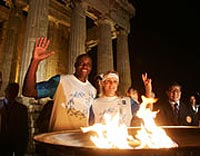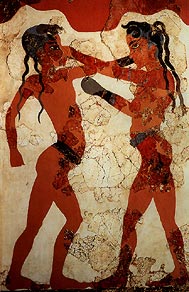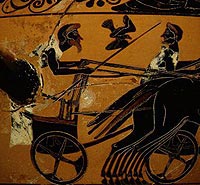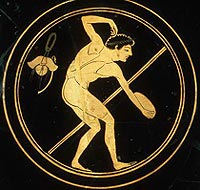| (insert your NIE or newspaper logo here) |
Weekly Online LessonOnline Lesson ArchiveGrade Level: 6-8
|
The Olympics Return Home
 Last week, the Olympic Games returned to its roots in Athens, Greece, when the Olympic torch completed its travel through all five continents, 26 countries, and included over 11,000 participants in the event's ceremonial relay.
Last week, the Olympic Games returned to its roots in Athens, Greece, when the Olympic torch completed its travel through all five continents, 26 countries, and included over 11,000 participants in the event's ceremonial relay.
"We welcome the Olympic flame back home," Athens Mayor Dora Bakoyianni told the crowd gathered at the Acropolis on Thursday, August 12, 2004, the night before the games opened. "It will shine in the hearts of all people on Earth, carrying the message of peace and brotherhood."
The last time Athens hosted the Olympic Games was in 1896, the inaugural year of the modern-day event.
According to the ancient Greek myth, heroes and gods were the ones who held the very first Games. Historical records show that the Games were held as early as 776 B.C. and continued for nearly 12 centuries.
The original Games were dedicated to the Olympian Gods and were staged on the ancient plains of Olympia, famous for its magnificent temples of the gods Zeus and Hera. Well-trained athletes traveled to Athens from every corner of the Greek world to compete, with the hope of returning home as heroes. The Games also provided noble competition and a break from war.
Certainly, some things have changed since ancient times. The Games are now hosted by a variety of cities and countries, rather than at a permanent home in Athens. Plus, they include many more events than the ancient Games, and now women can compete.
For this week's lesson, you'll take a tour through the ancient Games and see how they compare with the modern Olympics.
An Olympics Overview
 Let's first begin with an overview of The Ancient Olympics at the Perseus Digital Library Project of Tufts University.
Let's first begin with an overview of The Ancient Olympics at the Perseus Digital Library Project of Tufts University.
Start with the Frequently Asked Questions section.
Review all of the questions, including Why were they held at Olympia?, Who could compete in the Olympics?, How were the athletes trained?, What prizes did Olympic victors get?, Who were the Olympic judges?, and What was the penalty for cheating?
Now learn more about the individual Ancient and Modern Olympic Sports.
Browse through all of the sporting events -- Boxing, Equestrian events, Pankration, the Pentathlon, Running, and Wrestling.
What are some of the differences and similarities in the ancient versions of these events and the modern ones?
Next, let's find out more about The Context of the Games & the Olympic Spirit. Read the overview, then explore the related topics linked at the bottom of the page.
 For example, in what ways did the Olympic Games promote Excellence and the competitive spirit? What exactly was The Olympic Truce, and why was it important?
For example, in what ways did the Olympic Games promote Excellence and the competitive spirit? What exactly was The Olympic Truce, and why was it important?
Did politics ever affect the ancient Games? Who were Spectators at the Games?
If you have time, also Take a Tour of Ancient Olympia, and read some of the Athletes' Stories.
A Run Through Time
Now let's follow the history of The Olympics Through Time, at the Foundation of the Hellenic World.
Let's begin looking at how the Games evolved beginning in Ancient Olympia to Athens of 1896. Click english to enter this section.
 Read about athletic events that occurred in prehistory, from the Near East, to Minoan Crete, those held by the Myceneans, how they were documented during the Homeric Age, how the Polis influenced athletics, and how Olympia became the spot of the most important athletic festival in the world.
Read about athletic events that occurred in prehistory, from the Near East, to Minoan Crete, those held by the Myceneans, how they were documented during the Homeric Age, how the Polis influenced athletics, and how Olympia became the spot of the most important athletic festival in the world.
How do you think some of the commonalities in these various games came about between the different cultures? In what ways were the games important to various aspects of these societies?
Now read about the impacts of the Olympic Games on Antiquity. You'll discover the Importance of the Games, how the Olympiad evolved over the years, what Rules were enforced, more details about the Athletic Events, meet some of the Olympic Victors, and learn how Art also had a place here.
 After a glorious run of nearly 12 centuries, the world changed and the Olympic Games were abandoned. It wasn't until the 19th century that there was a Revival of this ancient tradition in the modern world.
After a glorious run of nearly 12 centuries, the world changed and the Olympic Games were abandoned. It wasn't until the 19th century that there was a Revival of this ancient tradition in the modern world.
Why were the Games revived at this point in time? How had Athens changed? In what ways were the First Attempts different from the ancient Games? What happened during the 1896 Olympics? What were the Issues and Symbols that became part of the revival?
Lastly, let's look at the evolution of the modern Olympic Games -- from Athens of 1896 to Athens of 2004. Again, click english to enter.
Use the timeline to find out about each Olympic Games event -- from Athens to Paris, Stockholm, St. Louis, Berlin, Tokyo, Los Angeles, London, Rome, Helsinki, Mexico City, Munich, Moscow, Seoul, Barcelona, Melbourne, Atlanta, and Sydney.
What were some of the challenges the Olympic organizers faced? What were the responsibilities of the host cities, and how well were they able to handle the event? What other events were going on in the world that may have affected the Games that year?
Newspaper Activities
Follow the Olympic Games in Targetnewspaper over the next couple of weeks. Which events are being covered the most and why? What kinds of news can you find about the American Olympians? Who are some of the gold medalists, and which cities and countries do they call home? How are spectators responding to events? Do politics seem to be influencing these Games in any way?
© Copyright 2004
Learners
Online,
Inc.
